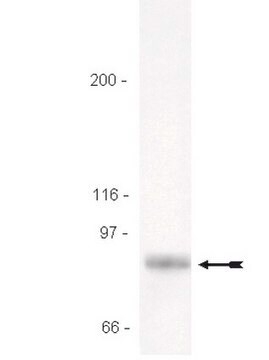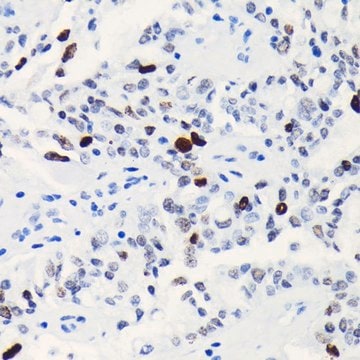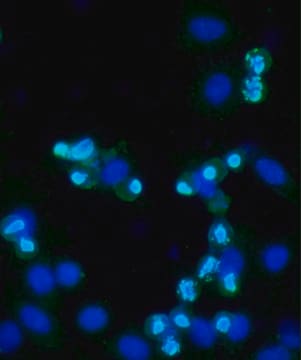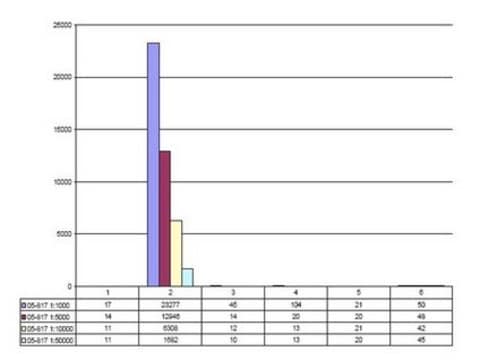推荐产品
生物源
rabbit
品質等級
抗體表格
affinity purified immunoglobulin
無性繁殖
polyclonal
純化經由
affinity chromatography
物種活性
mouse, human
製造商/商標名
ChIPAb+
Upstate®
技術
ChIP: suitable
dot blot: suitable
immunocytochemistry: suitable
inhibition assay: suitable (peptide)
western blot: suitable
NCBI登錄號
UniProt登錄號
運輸包裝
dry ice
相关类别
一般說明
All ChIPAb+ antibodies are individually validated for chromatin precipitation, every lot, every time. Each ChIPAb+ antibody set includes control primers (tested every lot by qPCR) to biologically validate your IP results in a locus-specific context. The qPCR protocol and primer sequences are provided, allowing researchers to validate ChIP protocols when using our antibody in their chromatin context. Each set also includes a negative control antibody to ensure specificity of the ChIP reaction.
The ChIPAb+ Phospho-Histone H3 (Ser28) set includes the Phospho-Histone H3 (Ser28) antibody, a Normal Rabbit IgG, and control primers which amplify a 166 bp region of the human GAPDH promoter. The Phospho-Histone H3 (Ser28) and negative controls are supplied in a scalable "per ChIP" reaction size and can be used to functionally validate the precipitation of Phospho-Histone H3 (Ser28)-associated chromatin.
The ChIPAb+ Phospho-Histone H3 (Ser28) set includes the Phospho-Histone H3 (Ser28) antibody, a Normal Rabbit IgG, and control primers which amplify a 166 bp region of the human GAPDH promoter. The Phospho-Histone H3 (Ser28) and negative controls are supplied in a scalable "per ChIP" reaction size and can be used to functionally validate the precipitation of Phospho-Histone H3 (Ser28)-associated chromatin.
Histone H3 is one of the five main histone proteins involved in the structure of chromatin in eukaryotic cells. Featuring a main globular domain and a long N-terminal tail, H3 is involved with the structure of the nucleosomes of the ′beads on a string′ structure. The N-terminal tail of histone H3 protrudes from the globular nucleosome core and can undergo several different types of epigenetic modifications that influence cellular processes. These modifications include the covalent attachment of methyl or acetyl groups to lysine and arginine amino acids and the phosphorylation of serine or threonine.
免疫原
Epitope: Phosphorylated Ser28
KLH-conjugated linear peptide corresponding to Histone H3 phosphorylated at Ser28.
應用
Chromatin Immunoprecipitation:
Representative lot data.
Sonicated chromatin prepared from untreated or colcemid-treated HeLa cells (1 X 106 cell equivalents per IP) were subjected to chromatin immunoprecipitation using either 5 µl Normal rabbit IgG, or 5 µl Anti-phospho-Histone H3 (Ser28) and the Magna ChIP® A Kit (Cat. # 17-610). Successful immunoprecipitation of phospho-Histone H3 (Ser28)- associated DNA fragments was verified by qPCR using ChIP Primers, human GAPDH promoter region for untreated and treated chromatin samples (Figure 2). Data is presented as percent input of each IP sample relative to input chromatin for each amplicon and ChIP sample as indicated.
Please refer to the EZ-Magna ChIP A (Cat. # 17-408) or EZ-ChIP (Cat. # 17-371) protocol for experimental details.
Western Blot Analysis:
Representative lot data.
HeLa acid extract (lane 1) and recombinant Histone H3 (lane 2) were probed with Anti-phospho-Histone H3 (Ser28) (1:2,000 dilution).
Proteins were visualized using a Donkey Anti-Rabbit IgG secondary antibody conjugated to HRP and a chemiluminescence detection system. (Figure 3)
Arrow indicates phospho-Histone H3 (Ser28) (~17 kDa).
Dot Blot Specificity Analysis:
Representative lot data.
Histone peptides with various modifications (see table) were probed with Anti-phospho-Histone H3 (Ser28). Proteins were visualized using a Donkey Anti-Rabbit IgG secondary antibody conjugated to HRP and a chemiluminescence detection system. (Figure 4)
Immunocytochemistry Analysis
Representative lot data
Confocal fluorescent analysis of HeLa cells using Anti-phospho-Histone H3 (Ser28) (Red). Actin filaments have been labeled with AlexaFluor 488 dye-Phalloidin (Green). Nucleus is stained with DAPI (Blue). This antibody positively stains the mitotic cell nucleus. (Figure 5)
Peptide Inhibition Assay: A 1:500 dilution from a representative lot was blocked by phospho-Histone H3 (Ser28) peptides, but not non-specific peptides.
Representative lot data.
Sonicated chromatin prepared from untreated or colcemid-treated HeLa cells (1 X 106 cell equivalents per IP) were subjected to chromatin immunoprecipitation using either 5 µl Normal rabbit IgG, or 5 µl Anti-phospho-Histone H3 (Ser28) and the Magna ChIP® A Kit (Cat. # 17-610). Successful immunoprecipitation of phospho-Histone H3 (Ser28)- associated DNA fragments was verified by qPCR using ChIP Primers, human GAPDH promoter region for untreated and treated chromatin samples (Figure 2). Data is presented as percent input of each IP sample relative to input chromatin for each amplicon and ChIP sample as indicated.
Please refer to the EZ-Magna ChIP A (Cat. # 17-408) or EZ-ChIP (Cat. # 17-371) protocol for experimental details.
Western Blot Analysis:
Representative lot data.
HeLa acid extract (lane 1) and recombinant Histone H3 (lane 2) were probed with Anti-phospho-Histone H3 (Ser28) (1:2,000 dilution).
Proteins were visualized using a Donkey Anti-Rabbit IgG secondary antibody conjugated to HRP and a chemiluminescence detection system. (Figure 3)
Arrow indicates phospho-Histone H3 (Ser28) (~17 kDa).
Dot Blot Specificity Analysis:
Representative lot data.
Histone peptides with various modifications (see table) were probed with Anti-phospho-Histone H3 (Ser28). Proteins were visualized using a Donkey Anti-Rabbit IgG secondary antibody conjugated to HRP and a chemiluminescence detection system. (Figure 4)
Immunocytochemistry Analysis
Representative lot data
Confocal fluorescent analysis of HeLa cells using Anti-phospho-Histone H3 (Ser28) (Red). Actin filaments have been labeled with AlexaFluor 488 dye-Phalloidin (Green). Nucleus is stained with DAPI (Blue). This antibody positively stains the mitotic cell nucleus. (Figure 5)
Peptide Inhibition Assay: A 1:500 dilution from a representative lot was blocked by phospho-Histone H3 (Ser28) peptides, but not non-specific peptides.
Research Category
Epigenetics & Nuclear Function
Epigenetics & Nuclear Function
Research Sub Category
Histones
Histones
This ChIPAb+ Phospho-Histone H3 (Ser28) -ChIP Validated Antibody & Primer Set conveniently includes the antibody & the specific control PCR primers.
包裝
25 assays per set. Recommended use: 5 μL of antibody per chromatin immunoprecipitation (dependent upon biological context).
品質
Chromatin Immunoprecipitation:
Representative lot data.
Sonicated chromatin prepared from colcemid-treated HeLa cells (1 X 106 cell equivalents per IP) were subjected to chromatin immunoprecipitation using either 5 µl Normal rabbit IgG, or 5 µl Anti-phospho-Histone H3 (Ser28) and the Magna ChIP® A Kit (Cat. # 17-610). Successful immunoprecipitation of phospho-Histone H3 (Ser28)-associated DNA fragments was verified by qPCR using ChIP Primers, human GAPDH promoter region (Figure 1).
Please refer to the EZ-Magna ChIP A (Cat. # 17-408) or EZ-ChIP (Cat. # 17-371) protocol for experimental details.
Representative lot data.
Sonicated chromatin prepared from colcemid-treated HeLa cells (1 X 106 cell equivalents per IP) were subjected to chromatin immunoprecipitation using either 5 µl Normal rabbit IgG, or 5 µl Anti-phospho-Histone H3 (Ser28) and the Magna ChIP® A Kit (Cat. # 17-610). Successful immunoprecipitation of phospho-Histone H3 (Ser28)-associated DNA fragments was verified by qPCR using ChIP Primers, human GAPDH promoter region (Figure 1).
Please refer to the EZ-Magna ChIP A (Cat. # 17-408) or EZ-ChIP (Cat. # 17-371) protocol for experimental details.
標靶描述
~17 kDa observed
外觀
Affinity purified
Anti- Phospho-Histone H3 (Ser28) (Rabbit Polyclonal). One vial containing 125 μl of purified rabbit polyclonal IgG in buffer containing 0.1 M Tris-Glycine (pH 7.4), 150 mM NaCl with 0.05% sodium azide before the addition of 30% glycerol. Store at -20°C.
Normal Rabbit IgG. Two vials containing 75 μL of normal rabbit IgG in buffer containing 0.01M PBS with 0.1% sodium azide. Store at -20°C.
ChIP Primers, human GAPDH promoter. One vial containing 75 μL of 5 μM each primer specific for human GAPDH. Store at -20°C.
FOR: TAC TAG CGG TTT TAC GGG CG
REV: TCG AAC AGG AGG AGC AGA GAG CGA
Normal Rabbit IgG. Two vials containing 75 μL of normal rabbit IgG in buffer containing 0.01M PBS with 0.1% sodium azide. Store at -20°C.
ChIP Primers, human GAPDH promoter. One vial containing 75 μL of 5 μM each primer specific for human GAPDH. Store at -20°C.
FOR: TAC TAG CGG TTT TAC GGG CG
REV: TCG AAC AGG AGG AGC AGA GAG CGA
儲存和穩定性
Stable for 1 year at -20°C from date of receipt. Handling Recommendations: Upon first thaw, and prior to removing the cap, centrifuge the vial and gently mix the solution. Aliquot into microcentrifuge tubes and store at -20°C. Avoid repeated freeze/thaw cycles, which may damage IgG and affect product performance.
Note: Variability in freezer temperatures below -20°C may cause glycerol containing solutions to become frozen during storage.
Note: Variability in freezer temperatures below -20°C may cause glycerol containing solutions to become frozen during storage.
分析報告
Control
Includes normal rabbit IgG and primers specific for human GAPDH promoter
Includes normal rabbit IgG and primers specific for human GAPDH promoter
法律資訊
MAGNA CHIP is a registered trademark of Merck KGaA, Darmstadt, Germany
UPSTATE is a registered trademark of Merck KGaA, Darmstadt, Germany
免責聲明
Unless otherwise stated in our catalog or other company documentation accompanying the product(s), our products are intended for research use only and are not to be used for any other purpose, which includes but is not limited to, unauthorized commercial uses, in vitro diagnostic uses, ex vivo or in vivo therapeutic uses or any type of consumption or application to humans or animals.
儲存類別代碼
10 - Combustible liquids
Christopher Runyan et al.
Development (Cambridge, England), 133(24), 4861-4869 (2006-11-17)
During germ-cell migration in the mouse, the dynamics of embryo growth cause many germ cells to be left outside the range of chemoattractive signals from the gonad. At E10.5, movie analysis has shown that germ cells remaining in the midline
H Goto et al.
The Journal of biological chemistry, 274(36), 25543-25549 (1999-08-28)
Histone H3 (H3) phosphorylation at Ser(10) occurs during mitosis in eukaryotes and was recently shown to play an important role in chromosome condensation in Tetrahymena. When producing monoclonal antibodies that recognize glial fibrillary acidic protein phosphorylation at Thr(7), we obtained
Johanna R Reed et al.
Breast cancer research : BCR, 11(2), R21-R21 (2009-04-28)
Inflammation within the tumour microenvironment correlates with increased invasiveness and poor prognosis in many types of cancer, including breast cancer. We have previously demonstrated that activation of a mouse mammary tumour virus (MMTV)-driven inducible fibroblast growth factor receptor 1 (iFGFR1)
D N Chadee et al.
The Journal of biological chemistry, 270(34), 20098-20105 (1995-08-25)
We compared the nucleosomal organization, histone H1 subtypes, and histone H1 phosphorylated isoforms of ras-transformed and parental 10T1/2 mouse fibroblasts. In agreement with previous studies, we found that ras-transformed mouse fibroblasts have a less condensed chromatin structure than normal fibroblasts.
我们的科学家团队拥有各种研究领域经验,包括生命科学、材料科学、化学合成、色谱、分析及许多其他领域.
联系技术服务部门








